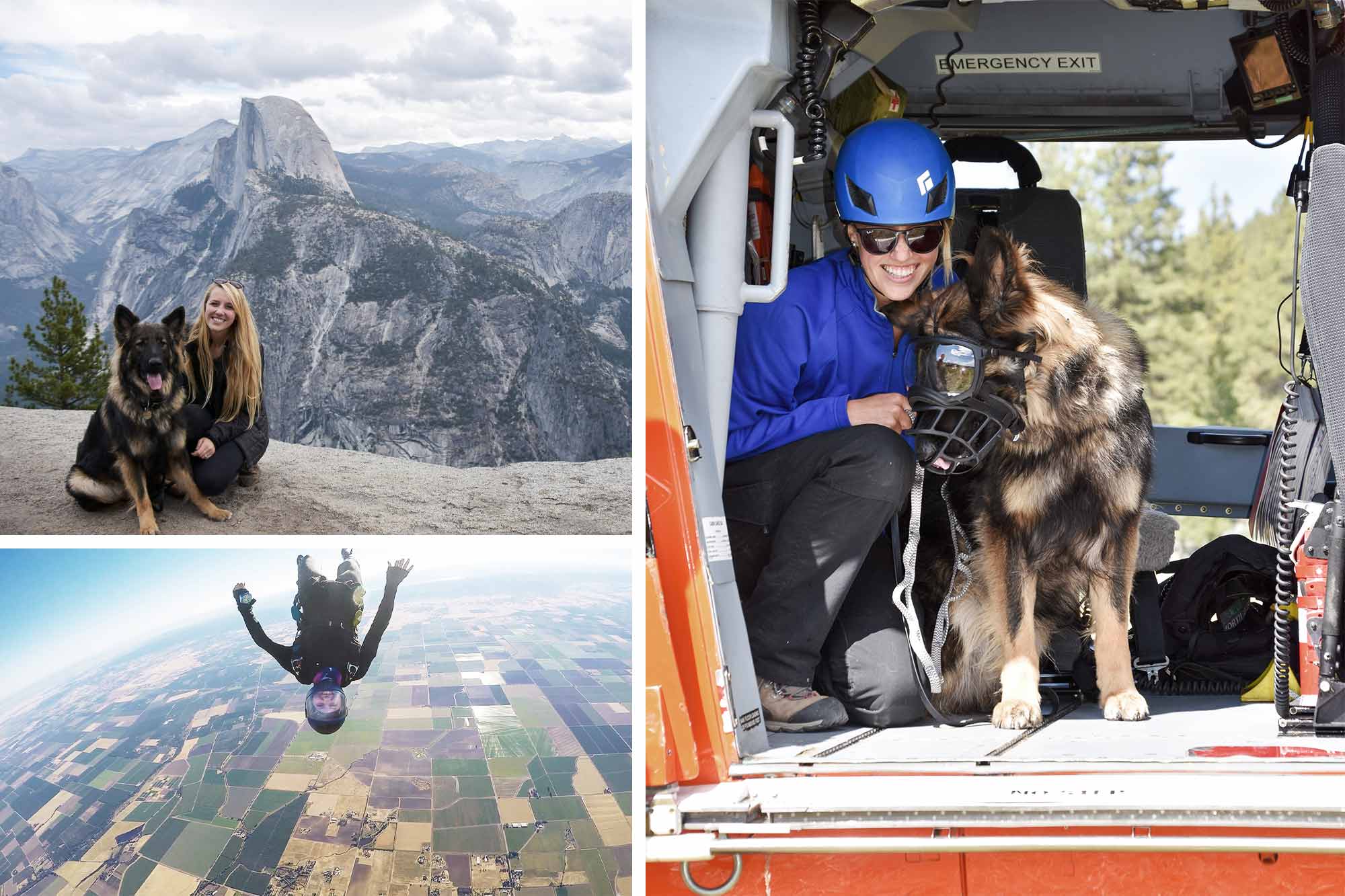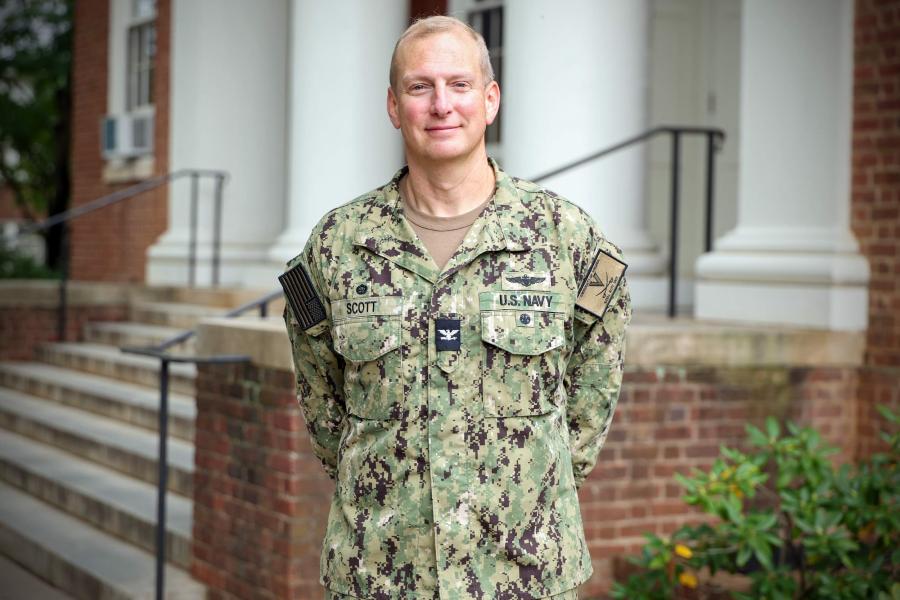Virginia Beach native Shelby Wolfe has been game for jobs ranging from bartending to skydiving to search-and-rescue missions in which she saw things that haunt her.
Now she’s game for law school at the University of Virginia School of Law, where the incoming first-year student wants to learn how to solve some of the problems she witnessed in her adventure-filled life.
In her seven years away from the East Coast and academia, she has experienced more than many people do in a lifetime, including thrills, exultation and guarded grief. From the day she entered the College of William & Mary as a psychology major, Wolfe considered herself pre-law. But by the time she graduated in 2015, she had hesitations.
“My minor was in religious studies, but I took a lot of cognitive science and neuroscience classes,” Wolfe said. “So when I graduated, I just felt really overwhelmed because there were all these things I wanted to do, and that I could see myself doing. I even thought about going to medical school.”
But before making any other decisions, she would go jump out of an airplane. More than 200 times.
Her skydiving career confused her parents, Wolfe admits, but she had a persistent desire to overcome her fears, including a pathological fear of heights.
“I didn’t want these fears to prevent me from doing things that would be really cool experiences,” Wolfe said. “That helped me when I was going through paramedic school because it’s just a lot of pressure, a lot of stress; you don’t want to mess anything up. I feel like that laid the foundation for even the idea of going back to law sch –”
Wait. Paramedic school?
After working as a licensed skydiving instructor at iFly Loudoun for 10 months, Wolfe and her boyfriend moved to South Lake Tahoe, California, to be ski instructors for one season. They fell in love – with the mountains and with the idea of spending their lives together – got married in Yosemite and have lived in the Tahoe region since. She wore hiking boots under her wedding dress.
With an eye to joining the resort’s ski patrol, Wolfe attained her Emergency Medical Technician certification and kept going from there. Within two years, she was a paramedic with nine relevant certifications, including advanced medical life support and avalanche certifications. She also held a volunteer search-and-rescue position as a canine handler with her certified search dog, Beckett.
As a full-time paramedic in a rural California county with staggering wealth inequality, Wolfe has witnessed all sorts of catastrophes. She’s delivered a baby, splinted ski injuries, saved patients who had overdosed on opioids or methamphetamines, and retrieved severed body parts from car wreckage.
She’s watched far too many patients refuse medical treatment and hospital transport because, they said, the bills would bankrupt them.
In one amputee’s case, using a medevac helicopter was the only chance the patient had to reattach the limb and preserve its use. If they drove, the limb tissue would die.
“The patient started crying, and I’m trying to comfort them, and they just look at me and they’re like, ‘Don’t fly me,’” Wolfe said. “And I literally don’t have a choice. We have their limb and if we drive them, it will not be reattached. And they just said, ‘Please. Don’t fly me. It’s gonna bankrupt me.’”
For better or worse, her persuasion skills won the day. The victim accepted the flight and did have their limb successfully reattached. But she’s never had a chance to catch up with the patient to see whether the medical crisis indeed led to a personal financial crisis.
“I hope it was worth it, you know?” Wolfe said.
Wolfe has tried to erase her emotions about the trauma she’s witnessed, but she’s never stopped thinking about her patients’ recurring financial dilemma, and she’s bringing it back East with her.
“I’m not even really talking about one specific patient there, because I saw that happen 100 times. Here in America, people have to choose between an actual limb and bankruptcy, and that is not OK,” Wolfe said. “I went home the next morning and I started studying for the LSAT – literally right after that shift.”
Although the amputee’s incident provided her moral and academic lucidity, Wolfe is still unsure which legal career path she’ll pursue in order to remedy this pervasive injustice she sees.
“Hopefully, I’ll get more clarity through my classes and professors, but maybe that means going into health care policy, because there are so many different aspects of our health care system that are just very broken,” Wolfe said. “I don’t know what it will take to fix them or what my role in that will be, but I hope to be a part of the solution.”
In August, Wolfe will be moving to Charlottesville with Beckett, the 92-pound German Shepherd rescue dog. She’s looking for a local volunteer search and rescue team for her and her K9 sidekick, who specializes in sniffing out live bodies. Her husband, Alex, will join her after the first year is over.
Rescuing a living victim is still on her quickly shrinking bucket list, along with base-jumping off the New River Gorge Bridge in West Virginia – perhaps with some Law School classmates – and shark-diving.
The Law School’s softball league may or may not be on that bucket list. She pleads the Fifth.
“I couldn’t tell you the last time I played softball – I don’t know how coordinated I would be,” Wolfe laughed. “But more than anything you can say about me is yeah, I’m game. I’ll give it a shot!”
Media Contact
Article Information
August 22, 2025






